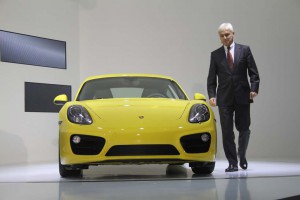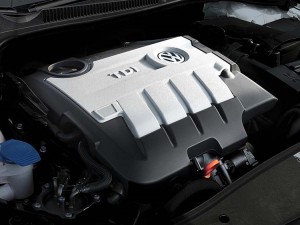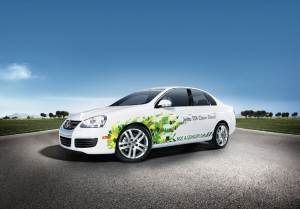Volkswagen will attempt to resolve a scandal involving cheating on diesel emissions tests by retrofitting 11 million vehicles with hardware it expects will bring them into compliance with government pollution standards in the U.S. and other parts of the world.
Customers will be contacted “in the next few days” with details of the fix, said Matthias Mueller, who was named CEO last week after predecessor Martin Winterkorn took responsibility for the scam. VW was found by the U.S. Environmental Protection Agency to have used a “defeat device,” software that could recognize when one of the vehicles was undergoing emissions test. Otherwise, the diesels would be allowed to produce up to 40 times the legal limit of smog-causing oxides of nitrogen.
The retrofit comes as VW faces potential EPA fines of more than $18 billion in the U.S., as well as a criminal investigation. Similar problems face it abroad, German authorities demanding a fix by October 7th. But beyond the actual cost of the repairs – estimated by some analysts at $6.5 billion – the retrofit actually could exacerbate the legal dilemma the maker faces in the U.S. where a number of class action lawsuits by consumers have already been filed.
“None of my clients would own these cars. They wouldn’t have paid the premium,” said Scott Schlesinger, a Florida lawyer who was one of the first to file a class action lawsuit against Volkswagen.
(New VW CEO Mueller faces long list of major problems. Click Here for the latest.)
One of the big questions is how the retrofit will work and how effective it will be. Among other things, VW will all but certainly have to replace the suspect software code. Meanwhile, on most of the 482,000 cars sold in the U.S., it may have to modify the 4-cylinder diesel engine to use a urea injection system. That is a more advanced approach to reducing NOx than was originally used on the vehicles in a bid to hold down costs.
The real concern, industry observers caution, is what impact the modifications will have on three key factors: emissions, fuel economy and performance. There is no doubt that VW will have to bring the vehicles into compliance with pollution mandates wherever they’ve been sold. But that could mean the vehicles might see a loss in performance, mileage or both.
That would be a major setback, as one of the factors that helped VW win over buyers was the claim that its diesels were not only clean and fuel efficient but delivered the sort of performance not available from green alternatives such as hybrids.
“My clients bought these cars on good faith based on lies,” contended Schlesinger.
(VW case is amping up anti-diesel movement worldwide. Click Herefor more.)
In cases such as the General Motors ignition switch recall there often are clear losses that plaintiffs can point to – something GM tried to address by setting up a victims’ compensation fund that established a formula to cover such things as pain, suffering, lost wages and other actual economic losses. In the Volkswagen case, setting a monetary figure could prove more challenging.
A few years ago, Korean carmakers Hyundai and Kia were found to have lied about fuel economy, the mileage of some models overstated by up to 6 mpg. The maker voluntarily offered to cover the estimated higher fuel costs owners faced. But the companies also wound up paying fines and settling lawsuits filed by consumers.
In the case of Volkswagen, “If this fix forces the vehicles to perform less than at the time of purchase I can see a class,” said Ted Craig, chair of the class action defense team at Florida’s GrayRobinson. While Craig said that while it would be a difficult argument to make, “There is a potential argument for a complete refund and, obviously, that would be disastrous for VW.”
VW faces additional class actions abroad that could worsen its financial woes. It is all but certain to be fined by U.S. regulators and could face additional fines if the Justice Department finds it has a case. Prosecutors could also decide to pursue charges against individuals involved in the long-running scam and subsequent cover-up attempts.
While no individuals were prosecuted as the result of cases involving GM and Toyota safety lapses, legal experts caution the situation here is different since Justice might conclude there was a criminal conspiracy to defraud the EPA as well as consumers.
German prosecutors, meanwhile, have turned the spotlight on ousted VW CEO Winterkorn. While he said he was “responsible” for the scandal in his role as chief executive, Winterkorn denied actually knowing about the scam. Investigators clearly want to know if he’s telling the truth. VW itself has said it will pursue those who were involved and the company has already suspended a number of senior officials.
(For more on the German investigation, Click Here.)




This whole thing reminds me so much of the Enron debacle. The situation where environmental regulators questioned the company for a year about the problem only to be told that they weren’t conducting testing the right way is almost identical to Enron execs telling financial regulators that they weren’t smart enough to understand the complicated transactions the company was doing. If it does go the same way as Enron, the top people will go to jail, financial liabilities will bankrupt the company, and VW will cease to exist. All because of a climate of terminal hubris at the top.
Potentially can bankrupt VW.
I would prefer the option of VW buying the car back. Mine is a 2014 Jetta TDI and its current resale value has dropped by 50% in a week.
I feel violated, lied to and cheated (what a combination). Not everyone will want to sell but some will, me included.
The car will not/is not the same as the one I bought, I will wait for the verdict of the North American fix, but I’m really pessimistic of the outcome.
This was my third VW and without a buy back it will be my last. Having said that, I don’t expect full purchase price plus damages, just fair market value (before the cheating was discovered) plus a little for the joy of making VW pay for their miss deeds and the hassle of all of this.
I have some hope my new Passat will handle being reflashed without becoming a slug, but my 2011 Jetta is a big worry. It is a blast to drive and don’t see how it can stay that way without a very expensive retrofit.
I’m of two minds about this: I hate being duped by VW and don’t want to be saddled with a slug. But the car is so much cleaner and better performing than the Mercedes I drove for 24 yrs. and I’m sure it still will be even after strangling by VW.
The cars are not going to lose a lot of power or mpg. That’s why it was so dumb for whomever decided to tinker with the software to install a means to detect an emissions test.
Unofficial testing with mobile emissions measurement equipment showed 15-35 times the NOx CA allows but these measurements were not under actual CA diesel emissions test parameters. They were results from general driving by individuals looking to understand why the VW and BMW engine results differed. The vehicles still violate the law because of the detection software. The unfortunate situation is even though all of the VW diesels meet emissions requirements world wide, VW chose to not run the full emissions equipment 100% of the time, which is mandatory in some instances but not all. This was obviously done to improve mpg/power as some consumers are obsessed with these figures.